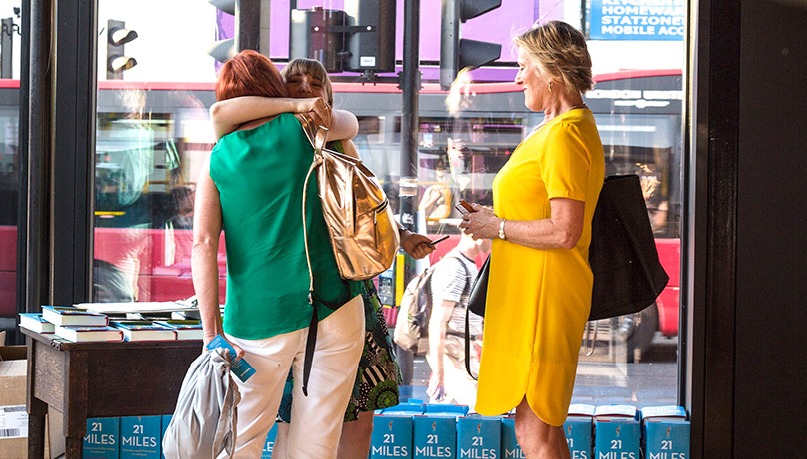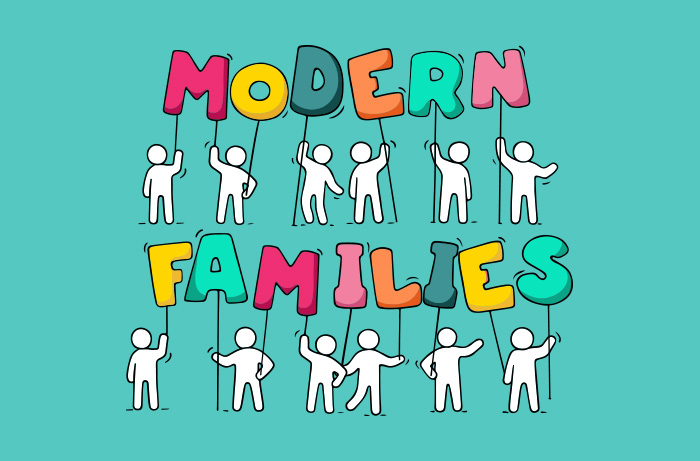Fertility Fest 2019 has been a three week extravaganza of incredible talks, workshops, displays, discussions and performances: I laughed, I cried, I felt informed, inspired, educated, engaged, enraged, encouraged, moved, motivated — and part of something very special indeed. I can’t possibly do justice to the sheer variety and breadth of Fertility Fest; but in this wrap up, I’m going to highlight some themes that criss-crossed the entire programme of events, that have beautifully demonstrated the power of the arts to change the world of fertility and infertility for the better.

Breaking the silence
“Art is brilliant at unlocking the human stories behind the stigma. Then comes insight, connection and empathy, which helps to break the taboo, encouraging people to say ‘I understand’ and ‘me too’.”
Fertility Fest co-founder Jessica Hepburn
Opening the conversation around fertility and infertility has always been at the heart of what Fertility Fest is all about: but Fertility Fest 2019 shone a light upon particular issues that so often remain in the shadows. The face of infertility in the public narrative is so often a white woman in her mid 30s — yet the real faces of infertility are so much more diverse than that.
The Invisible Man
Men’s voices in the narrative around infertility have been largely conspicuous by their absence — but not at Fertility Fest. The male perspective on infertility, the need for better provision for men going through a fertility journey, and the importance of encouraging men to talk about their experiences were consistent topics across a range of sessions — not restricted to ‘The Invisible Man’ event. From James De Souza giving an impassioned Fertility Fight Club speech reminding us that ‘Men Have Feelings Too’ on the Big Fat Festival Day; to Rod Silvers using his unique style of humour and warmth to give a voice to childless men at ‘There’s More to Life Than Children’; to Foz Foster sharing his perspective of being a Dad to 3 miscarried babies in ‘The M Word’; to Ricky Martin and Lewis Vaughan-Jones sharing their experiences of making decisions about their fertility treatment journey at ‘The Big Fertility Questions’ — this year men were anything but invisible.

Race, Religion & Reproduction
Infertility doesn’t discriminate: transcending socio-economic background, gender, race and religion — yet this diversity is rarely reflected in the public discourse around infertility. The truth is that infertility disproportionately affects women of colour, and there are different pressures and prejudices depending on the community you come from — one of the biggest infertility taboos. Fertility Fest 2019 tackled this head on with an inspirational workshop on ‘Race, Religion & Reproduction’, where a room full of artists, experts and participants asked difficult questions about how infertility intersects with ethnicity, faith and culture — and how to break the silence around this more widely. Yvonne John also addressed this subject in a spine-tingling Fertility Fight Club speech entitled ‘Black Girls Do Cry’, about the little discussed issue of infertility in black women, and the cultural myths and stereotypes surrounding this: exhorting us all to listen to the silenced voices of childless women of colour:
“We want you to remove your colourblindness and see our difference.”
Young, Gifted & Infertile
The face of infertility that is almost never seen is the young woman in her teens or early 20s who’s told she may never have a child, before she’s even started to think about having children — and who’s not long out of childhood herself. ‘Young, Gifted and Infertile’ was an evening about breaking the silence around it feels to be told as a young woman that you were born without a womb (a condition called Mayer-Rokitansky-Küster-Hauser syndrome, or MRKH), or diagnosed with early menopause (a condition called premature ovarian insufficiency, or POI). We saw an electric performance of Catherine Cranfield’s play Flushed, and Tasha Bishop’s soul-stirring talk about empowerment and activism after being diagnosed with MRKH. It’s hard to put into words how profound this evening was , but I think Tasha expresses it beautifully — describing the power of breaking the silence about these little-known issues on-stage:
“Being diagnosed with MRKH — or indeed POI, and probably many other forms of infertility — is like someone flushing the life you thought you’d have, down the toilet. It’s like someone put your plans and hopes and longings into a toilet, along with any sense of femininity or dignity you have, and drowned them. Suddenly you have this new life canvas you never expected to have, and it’s terrifying, heartbreaking and isolating.”
And also breaking the silence amongst one’s peers, as women in the audience came together afterwards, united only by a shared infertility diagnosis:
After the event, I met some of my MRKH sisters …It felt like coming home. It felt like we were part of this amazing club of women who were just a little bit stronger and more unique, because we didn’t have a choice. ❤️❤️❤️
Profit vs Patients
Another common thread across the festival was addressing the tension between commerce and care within the fertility industry — and in particular transparency around success rates, and the ethics of selling potentially-unproven (and profitable) treatments to desperate and vulnerable patients. The question of add-ons within the private sector provoked a healthy discussion between patients and clinicians in ‘The Big Fertility Questions’, and a no-holds-barred Fertility Fight Club talk from Prof Susan Bewley about Abuse in ART — but was perhaps most heartbreakingly illustrated in Maxine Peake’s spellbinding performance in Avalanche.
In Australia, where Avalanche’s author Julia Leigh had her IVF treatment, clinics aren’t required to reveal their success rates to patients as they are in the UK. On stage this translates into evasive, uncommitted comments that obsfuscate the true chances of success for a 44 year old woman, and emotionally manipulative advice to try again: and to try expensive, unproven add-ons, so as not to regret not having tried everything possible. The tension is most achingly laid bare as Maxine Peake’s character continues to beg her Drs for advice on what she should do — only to be told, over and over, ‘It’s up to you’.

When it doesn’t work
The festival is like walking into a huge hug. There is, above all, a sense of shared experience and community that feels very empowering.
Fertility Fest co-founder Jessica Hepburn
One of the things that makes Fertility Fest so special is that it explores the experience of infertility as it is — not as it ought to be. And ‘as it is’ is sadly often unsuccessful. The tolls of infertility are immense: throughout the festival we heard different stories about how it feels when your body doesn’t work, when treatment doesn’t work, when relationships don’t work, when life doesn’t work out how you’d hoped. But whilst there’s undoubtedly space and room to acknowledge trauma and grief, Fertility Fest isn’t one long misery-fest — it finds the chink of light through the darkness, and (in the words of one of my favourite sessions from Fertility Fest 2018) how to make something beautiful out of a mess.
In the ‘Women Speak’ session of ‘There’s More to Life Than Children’, singer-songwriter Chiara Beradelli and theatre-maker Victoria Firth both performed deeply personal works about finding their own way through the loss of their dreams to become a mother — describing how to find a new ‘once upon a time’ after the ‘happy ever after’ never turned up. This was echoed in ‘When ART Doesn’t Work’, where artists Faye Glen and Camilla Lyon shared their experiences of the creative process itself as a means of healing; channeling their emotions from unsuccessful treatment into their artistic practice.
In his poem Naked, Benjamin Zephaniah had previously described the heartbreak of being childless:
Dis is me fatherless, childless. Who do I go to and for what? Who shall I cry to? Who shall I cry for? I need babies to recite to I need babies to recite to me my life is full of lonely childless eternities
However in conversation with Jessica Hepburn during the ‘Men Speak’ session of ‘There’s More to Life Than Children’, he described the connection he’s forged with schoolchildren up and down the country who read his poetry, and observed that in fact:
‘I’ve got thousands of kids.’
I think the most powerful expression of this sentiment was in the final scene of Avalanche, as Maxine Peake’s character reflects on the end of her treatment and the “burning tender love” she feels for her nieces: she resolves to “love widely and intensely”, to unshackle the love from the great love she wanted to give her own child — from “I to You”, “I to We’, “I to This.”
There are many ways to parent without necessarily being a parent — to paraphrase Liz Fraser, ‘Mother’ is a doing word.
When it does work
Fertility Fest is a space where the two sides of infertility come together: those who’ve been successful, and those who haven’t — because we have more in common than divides us. ‘Parenting After IVF’ explored the truth about having a baby via treatment, and the legacy of struggling to conceive: including pregnancy anxiety and survivors guilt at ‘Life and Lunch’, and the raw honesty of ‘To the Moon and Back’. This mother/daughter two-hander revealed some hard and unspoken truths about the experience of IVF from their respective perspectives — both as the fertility patient, and as the person born ‘special’ as a result of that fertility treatment. The perspectives of donor-conceived children were explored further in ‘The IVF Generation’, which tackled important questions about how advances in reproductive science are changing the way the human race is being made — as well as celebrating these advances with a lively panel discussion featuring very special guest speaker Louise Brown, the very first IVF baby (without whom none of the 8 million babies conceived via IVF in the last 40 years would have been born).
Every child is a gift, and it’s thanks to reproductive science that modern families are being created in new and different ways. So what better way to celebrate the gift of parenthood than a specially curated family event for families made through donation and surrogacy?

Modern Families
Fertility Fest is a festival quite unlike anything else — information and insight, support and solidarity, tears and laughter. It feels like I’ve only just scratched the surface of what’s been an incredible, profound, and life-changing 3 weeks. But at its heart is the very human desire to create a family — in whatever shape or form that may take. The programme of events for Fertility Fests 2016, 2018 and 2019 have focused heavily on infertility — and the emotional, physical and financial trauma of desperately wanting to have a child, but being unable to do so. This year’s festival closed with a fantastic collaborative workshop to discuss the future of fertility education in schools, as part of Fertility Fest’s ground-breaking Modern Families fertility arts education project: in the hope that better fertility education will help the next generation to have the best chance of creating the families they want in the future — with or without children, with or without reproductive science.
Fertility Education is the next frontier — and I’m really excited to see what comes next…